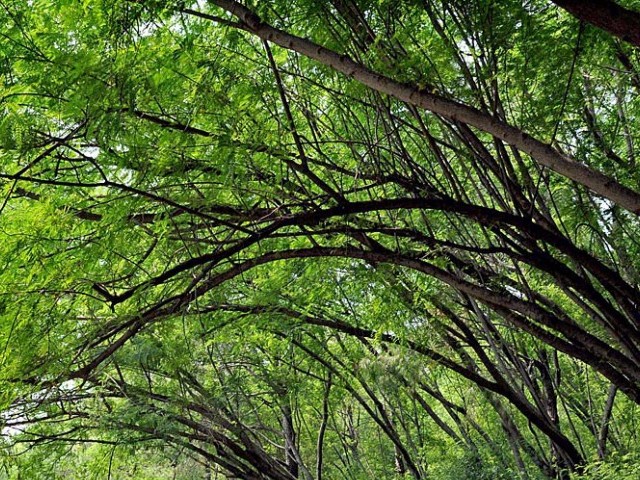
According to Food and Agriculture Organization, Pakistan has been experiencing deforestation at an annual average rate of 2.1% from 1990 to 2015 due to population explosion, increasing demand for firewood, agriculture expansion and timber mafia.
Alarming situation: Forests crucial in regulating climate, says UAF VC
In his attempt to protect forests and provide an alternate option to wood consumers in Pakistan, Ayub planted the Sesbania species on 100 acres of land in Naushero Feroze and Nawabshah districts with the help of Forest Research Institute Malaysia and was successful in reaping crops in record two years’ time.
As of 2016, Ayub has taken his initiative to Dadu and Khairpur districts and according to him, forest plantations have increased manifold to 3,000-4,000 acres in just a few years.
Forest and Co
Investment in forestry has now gained momentum in Pakistan, with Government of Punjab establishing South Punjab Forest Company (SPFC) to promote sustainable forest management through Public Private Partnership. The initiative is a unique example of combining forest conservation with sustainable economic development.
Established as a Public Sector Company, SPFC has the mandate to promote sustainable forestry investments on over 134,995 acres of land across six districts of Punjab: Bahawalpur, Dera Ghazi Khan, Rajanpur, Rahim Yar Khan, Muzaffargarh and Bahawalnagar.
SPFC’s business philosophy has three thematic pillars: social and environmental sustainability; a balanced portfolio of wood fiber end-uses; and cost and quality competitive projects. It aims to feed the wood-based industry and subsequently help in reducing pressure on existing forests.
Ashiq Ahmad Khan, one of the most experienced foresters in Pakistan with over four decades of experience, serves on the board of SPFC. According to him, the long-term objective of SPFC is greening of Punjab. “Starting from South Punjab is a good step as that region has not been used previously for afforestation. With SPFC, the government wants to create a model which can be replicated in other areas and provinces,” he shares.
Plants and profits
The idea to promote sustainable forest investment in Punjab was Sardar Awais Ahmed Khan Leghari’s brainchild. A member of the National Assembly and also the Chairperson of Standing Committee on Foreign Affairs, Leghari convinced policymakers in Punjab that sustainable forest management is the real solution to save existing forests of Pakistan and at the same time, create jobs in rural areas and provide wood to the industry.
K-P forests lose 74% density, claim officials
On engaging the private sector, forester Khan says the government’s forest departments don't have the capacity to address the need of afforestation and partnering with private investors can fill this vacuum. “This is the main objective of SPFC and I believe that it will be a good demonstration model. I hope this will be followed by Kashmir and other provinces as well,” he says.
Khan is hopeful that once SPFC passes its critical stages, it will become a successful model.
Regarding the criticism faced by the forest company, Khan laments how certain elements are skeptical of the project and are likely to create hurdles. “Changing mindsets is the toughest challenge and attitude problem can hamper smooth implementation of the plan as people are more interested in conventional methods and practices. The attitude of bureaucracy and traditional managers is another issue,” he highlights.
The economy of trees
Consumption of wood has been on the rise in Punjab and existing forests are being used to cover for energy shortfall and meet demands of the wood industry. CEO of SPFC Tahir Rasheed says that in order to supply for the demand for wood, Punjab will need to have mega forestry plantations on different types of lands such as river banks. “The Punjab Growth Strategy puts us on the path to realising this vision by trying to shift the focus from traditional forest management to sustainable commercial forestry,” he shares.
The establishment of SPFC, Rasheed adds, will also help address the needs of institutional investors seeking attractive returns and equitable risk in the long run. “All of this will eventually contribute to reducing deforestation in Punjab and promoting sustainable forestry investments at large,” he says.
It is hoped, the CEO says, that timber plantations would release logging pressure on natural forests of the area. “The company will address any ecological impacts, by working in collaboration with civil society and the Punjab Forest Department,” Rasheed states.
On challenges faced by SPFC, Rasheed says that since Pakistan is a data deficit country, there’s a need to collect information and devise monitoring indicators that will help evaluate the success of the project.
Beyond Punjab
Chair of Khyber-Pakhtunkhwa’s Green Growth Initiative Malik Amin Aslam says SPFC is a welcome step and a promising idea. “If rolled out with a sustainable management plan, it could satisfy the long-term needs for fuel wood in Punjab. This will surely provide a platform for sustainable forest management. The private sector leasing model, however, needs to be carefully monitored to avoid any abuse of the system,” he warns.
Government looks for private investments in forests
Promoting sustainable forest management is part of United Nation’s Sustainable Development Goals which Pakistan has committed to achieve. In addition to accomplishing this goal, it is hoped that SPFC will help decrease foreign deficit by reducing the demand for imported wood by the local industry. Interestingly, SPFC has received a positive response from foresters as the initiative aspires to conserve Pakistan’s remaining forests, promote investments in the forestry sector and create jobs. However, in order to be successful, the company should be free from any political interference, have transparent method to engage private investors and strong law enforcement to keep the land mafia out of the picture.
Syed Muhammad Abubakar is an international award-winning environmental writer with an interest in climate change, deforestation, food security and sustainable development.
He tweets @SyedMAbubakar


1723278472-0/BeFunky-collage-(4)1723278472-0-165x106.webp)














COMMENTS
Comments are moderated and generally will be posted if they are on-topic and not abusive.
For more information, please see our Comments FAQ